Broccoli needs a lot of nutrients to grow as a fast-growing plant. The life of the Broccoli crop is considered in three phases establishment, rapid growth, and maturity and at every stage, there are specific fertilizer requirements. Gardeners can choose from commercial or organic fertilizers, in quick-release or slow-release formulations. Let’s check out the best fertilizer for Broccoli.
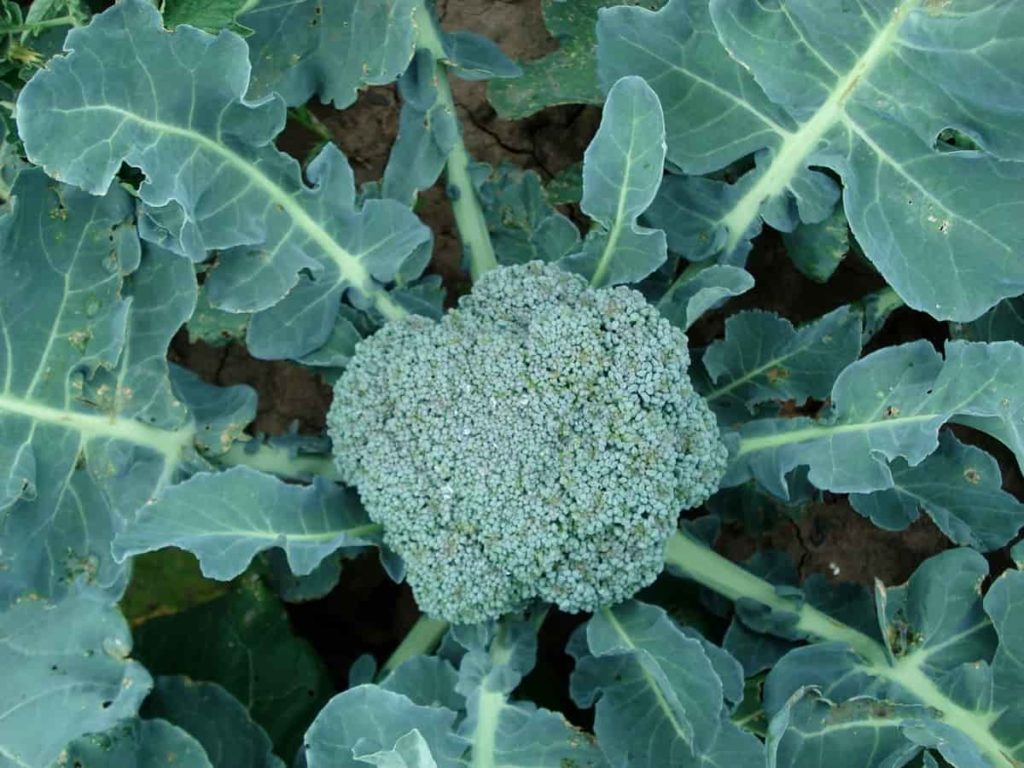
Commercial fertilizers are made from chemicals and are prepared to release quickly into the soil. Organic fertilizer breaks down more slowly than artificial fertilizers, so fewer chemicals run in nearby waterways. Crops like Broccoli need regular fertilization. Broccoli plants are heavy feeders and will do well with fertilizer food every two weeks.
The application of balanced fertilizer shows a better result that gives plants so much energy that they grow large enough to support the full heads of Broccoli. A combination of commercial fertilizers and organic fertilizers provides a great opportunity to increase Broccoli production at a low cost.
Best fertilizer for Broccoli
Homemade fertilizers for Broccoli
Coffee grounds
Coffee grounds make a great soil modification for Broccoli as well as many other vegetables. Broccoli in particular is a heavy feeder and can benefit from excess organic fertilizer. Coffee grounds have good amounts of nitrogen and small amounts of phosphorus and potassium. If you have plenty of coffee grounds, you can prepare your Broccoli bed before planting with coffee ground up to 2.5 centimeters and work it in the soil with a shovel, rake, or hand grower.
Make sure you mix it with soil, as the thick layer of dry coffee grounds will repel the water. If you already have Broccoli in the ground, you can top-dress it with the coffee ground. Topdressing means spreading manure over the soil and mixing it in the top inch or more of the soil. For top-dress, Broccoli, add about 1 to 2 tablespoons of coffee grounds used per square foot around your plants. Apply once a week in the entire season up to once a month.
Liquid fertilizers for Broccoli
Compost tea
Compost tea is the best all-natural fertilizer for vegetable plants. When using in the garden, apply once every two weeks after transplanting Broccoli.
In case you miss this: Broccoli Questions and Answers – Planting FAQs
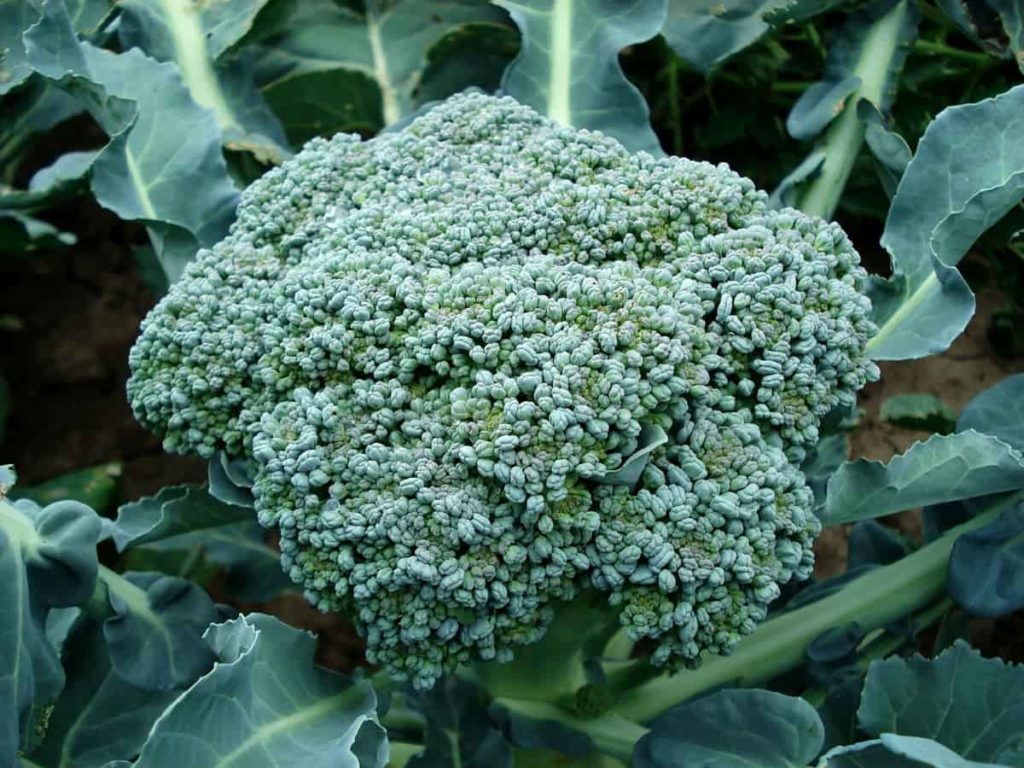
Fish emulation
Use a light mixture of liquid fertilizer as fish emulation on the growing seedlings to encourage rapid growth and provide additional nitrogen to improve the soil at the same time. Feed your Broccoli once a fortnight with liquid fertilizers like seaweed, manure tea, natal tea, etc.
Compost manure for Broccoli
Composting is a natural process of recycling organic matter such as leaves and food scraps into a precious compost that can enrich soil and plants to ensure that your soil is fertile enough by mixing it in at least 1 inch of fertilizer at the time of planting. You can also apply a high nitrogen organic fertilizer every few weeks, such as alfalfa or compost poultry manure. You must provide about one inch of water weekly.
- Well-aged manure – Broccoli is a moderately heavy feeder, so work in a thin layer of 2 to 4 inches of manure or well-aged manure before planting.
- Rabbit Manure – Rabbit manure or well-aged manure produces large and delicious heads.
- Worm Castings – Mix the worm castings through the soil before planting Broccoli and add extra structure to the ground. The worm castings will also have good bacteria that will feed the insects in your soil.
Organic fertilizers for Broccoli
Pelted chicken manure
Once your Broccoli heads are sprouted, do not apply any more fertilizer to your Broccoli plant. Pelleted chicken manure and slow-release fertilizers like blood and bone will support your plant for the next 2 to 3 months of growth.
In case you miss this: Growing Hydroponic Broccoli – A Complete Guide
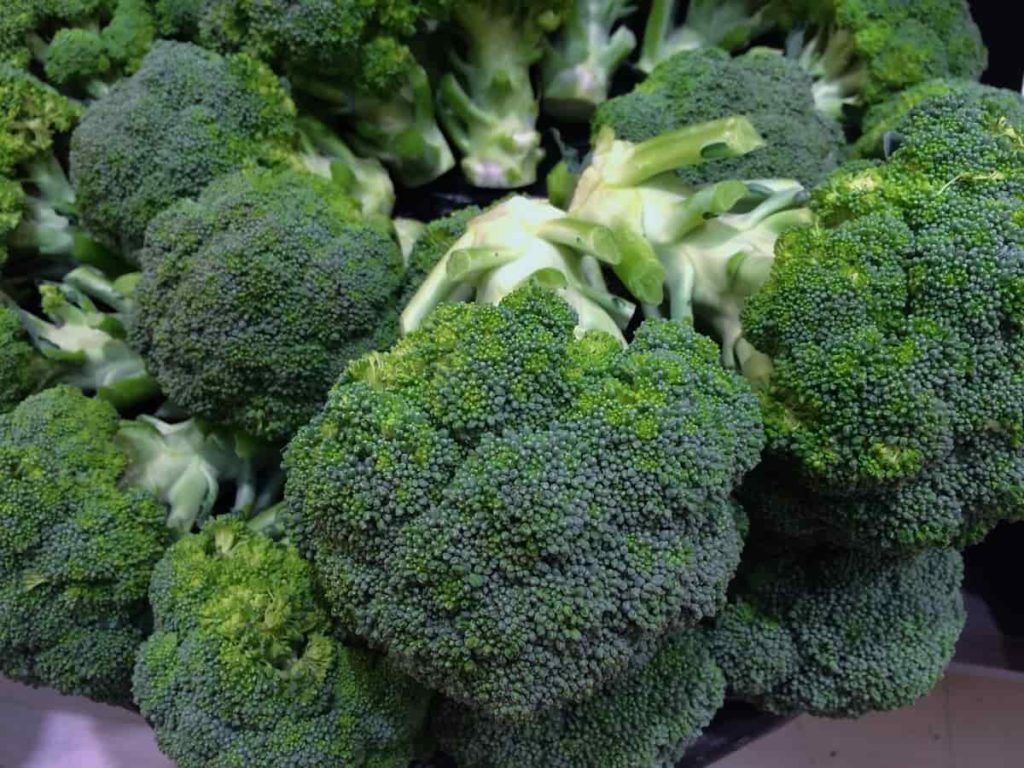
Blood and bone meal
Use blood and bone-based fertilizer every 4 weeks after planting Broccoli until you see the shape of a flower head. Blood and bone meal have more calcium so can produce strong stems. Broccoli likes rich, heavy mulch soil. When transplanting, you can add bone meal to the soil around the plant to encourage and support healthy growth.
Commercial fertilizers for Broccoli
NPK ratio
Use this all-purpose 20-20-20 fertilizer when transplanting your young Broccoli plants to their last location. Be sure to follow the package instructions. Liquid fertilizers are easy to apply. Granulated products are also relatively easy and may cost less. Remember to water your Broccoli immediately after fertilizing. This can soak nutrients in the root area.
Nitrogen
Proper nitrogen produces dark green Broccoli leaves. Nitrogen-deficient plants have light green leaves that eventually turn yellow and maybe shed. During hot, humid weather, excess nitrogen will increase the incidence of Broccoli’s head rot.
In case you miss this: Broccoli Gardening Techniques, Ideas and Tips
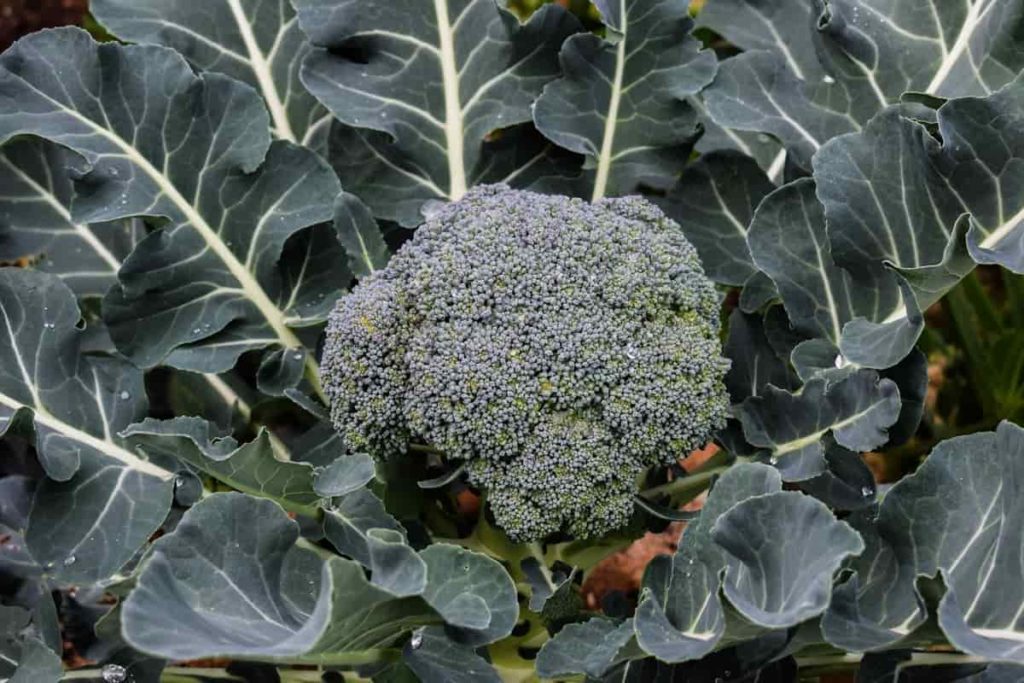
Phosphorus
Soil testing will determine the level of phosphorus requirements. Broadcast or band any needed phosphate before planting and disc in it. Phosphorus is important for Broccoli root development. The growth stops due to a lack of phosphorus.
Potassium
Soil testing will determine the requirements of potassium. Excessive potash can lead to an increase in tip burn. Potash competes with calcium for use from soil and perhaps that is what causes the increased tip burn.
Micronutrient fertilizers
Consider using micronutrient fertilizers to help build soil nutrients that your Broccoli plants may need to produce healthy fruits. Trace the amount of other chemicals helps vegetables like Broccoli grow well and produce good fruits. Lack of enough molybdenum can cause plant disorders in Broccoli. Lack of enough boron can cause bronzing of fruit.
Some of the fertilizers do not contain elements such as iron, manganese, boron, molybdenum, and copper. These compounds can be supplied from micronutrient fertilizers. Always read the label on your fertilizer to determine which nutrients are included in the formula.
In case you miss this: How to Grow Indian Vegetables in USA: at Home, in Backyard, and Pots – A Step-by-step Guide
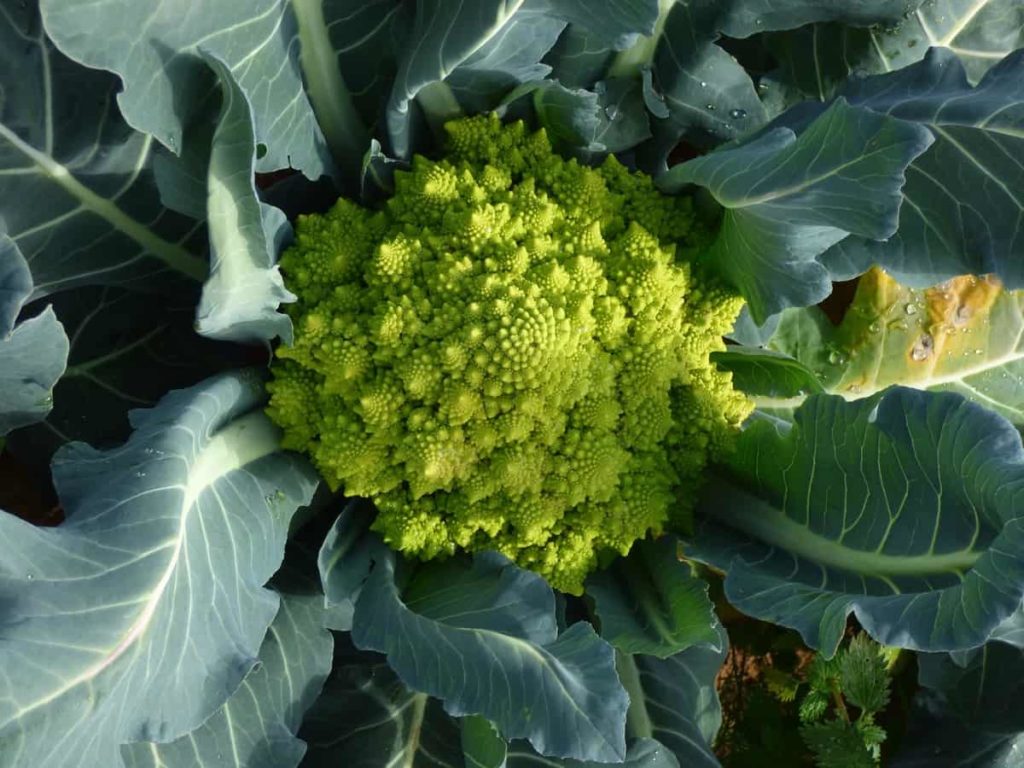
Magnesium
Old leaves first show signs of deficiency, including blotches of interveinal chlorosis. As chlorosis intensifies, purple spots can be seen near the leaf margins. Deficiency is particularly common on light acid soil where dolomite limestone has not been applied. Apply dolomite limestone or add limestone or add magnesium to the fertilizer to avoid these problems. Spray leaves with magnesium sulfate if this problem occurs during the Broccoli growing season.
Sulfur
Symptoms of early deficiency appear as a scar of the interveinal chlorosis on the youngest leaves. On sandy soils that are low in organic matter and are intensively cropped, maybe soil sulfate levels are low. The application of gypsum on these lands should be considered. Broccoli crops require a lot of sulfur.
Fertilizer’s schedule
- Broccoli plants are heavy feeders and will do well with fertilizer every two weeks. Use well-balanced fertilizer for best results. This will give the plants so much energy that they will grow large enough to support the full heads of Broccoli.
- Apply a balanced fertilizer (NPK 20-20-20) at an overall rate of 800 kg per hectare during the growing period. Apply to transplants or direct seeding sowing at 400 kg per hectare, about 3 to 4 weeks later at 200 kg per hectare, and about 6 or 7 weeks after planting up to 200 kg per hectare. You can directly add granular fertilizers to the soil level and irrigate. The grains mustn’t come in contact with small plants, as they are at risk of burning.
- You can also use ammonium sulfate. As soon as the plants start producing fruit, add ammonium sulfate at a half cup rate for a 10-foot of row. At the heading, you can add another dose of ammonium sulfate. When the seedlings are transplanted and are 4-5 inches tall, you can start applying granule fertilizer.
- You can also use a water-soluble fertilizer. Mix it according to the manufacturer’s instructions and apply it when you water your Broccoli plants. You can use a hose and sprayer or mix the product in a jug of water can. If you decide to use water-soluble products, start fertilizing Broccoli plants as soon as you transplant them. Scatter a balanced granule fertilizer in the Broccoli patch about a week before Broccoli seedlings are transplanted. You can also scatter some lime.
- If you are interested in growing Broccoli organically, you can do some compost or well rotten manure in the soil before planting. You can use organic products such as fish emulsions to fertilize your Broccoli plants. If you decide to fertilize with organic fertilizer, just make sure it is well balanced.
In case you miss this: Garden Vegetable Seeds for Winter
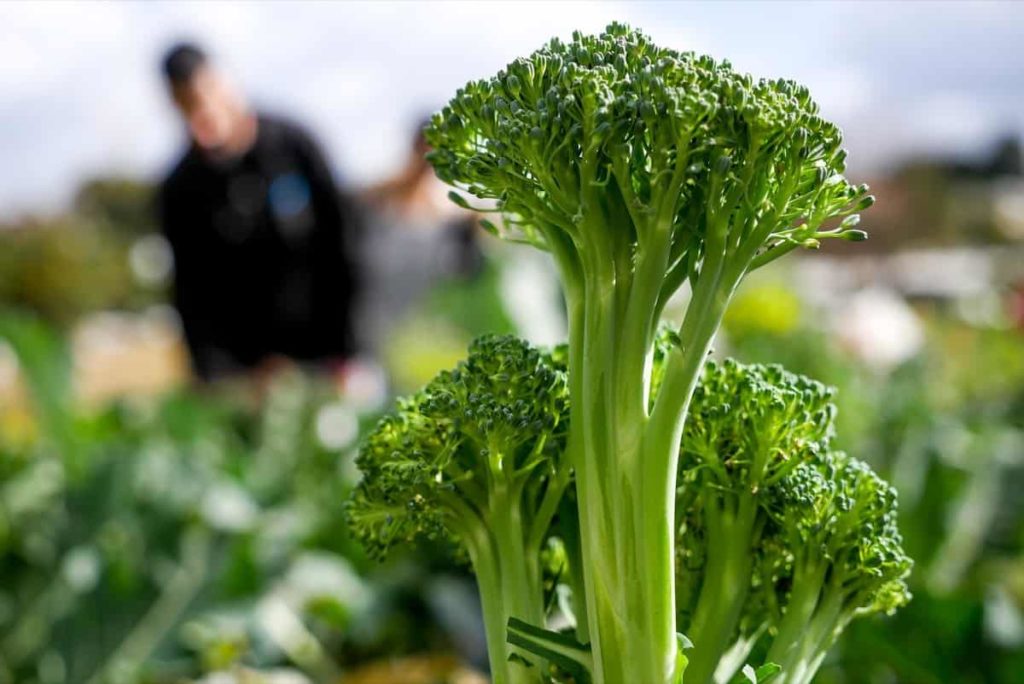
How to fertilize Broccoli in pots
Container planting of Broccoli can cause increasing problems as limited amounts of soil can quickly lead to nutrient deficiency. Use timed-released such as 10-10-10 or 14-14-14 formulas, which are well mixed with potting mix. You can then fertilize with the water-soluble fertilizers in the middle of the growing season, mix it according to the label instructions and add it to the container every week or two weeks.
Frequently asked questions about fertilizers for Broccoli
Does Broccoli-like high nitrogen?
Broccoli needs rich, well-draining soil to produce healthy heads. Modify the garden bed with enough organic matter, such as compost, well-aged manure, or other high nitrogen fertilizer. Broccoli plants will need enough nitrogen to grow good-quality heads of Broccoli.
How much nitrogen does Broccoli need?
80 to 100 kg nitrogen per acre is usually required for maximum Broccoli production.
Why is my Broccoli growing like a tree?
It is in response to extreme temperatures of stress or soil. Sometimes, Broccoli will grow taller and bolts before Broccoli gets a chance to make a big head.
- Growing Gold: Essential Techniques for Planting Pineapples
- How to Make Kalanchoe Plant Bushy: Home Remedies and Solutions
- 11 Reasons Why Your Gardenia is Not Blooming: Home Remedies and Solutions
- Eco Elegance: The Guide to Designing a Drought-Tolerant Landscape
- Gardening on a Slope: Strategies for Hillside Landscaping
- Nourish and Flourish: Top Organic Mulches for Thriving House Plants
- Everything You Want to Know about Indian Mogra Flower: Discover Uses and Growing
- Green Thumb Success: Expert Tips for Cultivating Greenhouse Pumpkins All Year Round
- Maximize Growth & Flavor: The Ultimate Guide to Companion Planting in Herb Gardens
- How to Control Rhododendron Problems Naturally: Home Remedies and Organic Ways to Fix Them
- Natural Magic: The Remarkable Benefits of Cinnamon for Plants
- Best Steps to Revive Dying Tulip with Natural and Organic Treatment
- 10 Reasons Why Your Angel Trumpet is Not Blooming: Remedies and Treatment
- How to Fix Periwinkle Leaf and Flower-Related Problems: Natural Remedies and Solutions
- How to Fix Zinnias Leaf and Flower Problems: Discover Natural and Home Remedies
- Organic Steps to Induce Lemon Tree Flowers: A Comprehensive Guide
- Bloom Booster: Crafting the Perfect Homemade Bougainvillea Fertilizer
- Optimizing Growth: A Guide to Applying NPK Fertilizer for Potted Plants
- 10 Best Homemade Fertilizers for Rubber Plant: DIY Recipes and Application Method
- How to Boost Female Pumpkin Flowers: Effective Steps for More Flowers and High Yields
- Transform Your Indoor Garden: Top Benefits of Pink Salt for Houseplants
- 10 Best Homemade Fertilizers for Peacock Plants (Calathea): Easy DIY Guide
- Unlock Blooms: 9 Reasons Why Your Potted Chrysanthemum is Not Blooming
- 8 Reasons Why Your Potted Hibiscus is Not Blooming: Fix it with Simple Solutions
- Unlock Blooms: 9 Key Reasons Your Potted Frangipani Won’t Flower
- 10 Reasons Why Is My Ice Plant Not Blooming: Remedies and Treatment
- 10 Reasons Why My Potted Hydrangea Not Blooming: Treatment and Remedies
- 10 Reasons Why is My Wisteria Not Blooming: Remedies and Treatment
- 10 Reasons Why is My Goldfish Plant Not Blooming: Remedies and Treatment
- Maximize Your Space: Ultimate Guide to Balcony Gardening with Grow Bags
- 10 Reasons Why Your Iris is Not Blooming: Remedies and Treatment
- 10 Reasons Why Your Anthurium Plant is Not Blooming: Treatment and Remedies
- 10 Reasons Why Your Aquaponic Plants Are Not Flowering: Remedies and Treatment
- 10 Reasons Why Your Agapanthus is Not Flowering: Remedies and Treatment
- Ultimate Guide to Brown Turkey Fig: Steps to Growing Brown Turkey Figs
- How to Grow Acai Berry: Propagation, Planting, and Care